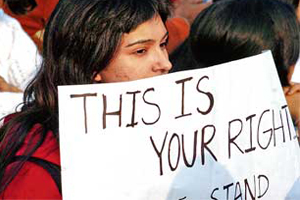
Oxfam India today released the findings of an opinion poll titled ‘Sexual Harassment at Workplaces in India 2011-2012” during a workshop held at the India Islamic Cultural Center. The report revealed that 17% of working women in India feel that they have experienced acts of sexual harassment at workplace, indicating a high incidence of sexual harassment among working women from both the organized and unorganized sectors. This research was jointly conducted by Oxfam India and Social and Rural Research Institute, a wing of IMRB International in Delhi, Mumbai, Bangalore, Chennai, Kolkata, Ahmadabad, Lucknow and Durgapur.
Most of these women reported to have faced incidents that were non physical. 66 of the 400 respondents, reported to have faced a cumulative of 121 incidents of sexual harassment. 102 out of 121 incidents were reported to be non-physical, whereas the remaining 19 incidents were physical in nature.
While 87 percent of the general population and 93 percent of working women respondents reported awareness of sexual harassment of women at work place, majority of the victims did not resort to any formal action against the perpetrator. The top three industries that have emerged unsafe for women are labourers (29 percent), domestic help (23 percent) and small scale manufacturing (16 percent).
“Violence against women is a human rights violation, whether it is domestic violence within homes or sexual harassment at the workplace. If the domestic sphere is not safe, the workplace is not safe, public spaces are not safe, then, where should women go? It is shocking that 17 percent of working women face sexual harassment in workplaces as per our study. Oxfam India strongly believes in the right of every woman to a violence free workplace. Each one of us has to take a stand and say ‘No to Violence against Women’”, says Nisha Agrawal, CEO, Oxfam India
Majority of respondents (both general population and working women) perceived women working in the unorganized sector to be more susceptible to sexual harassment due to lack of awareness of legislation. Interestingly, 26 percent reported to be the sole earning member of their families, indicating that economic vulnerability further makes women more vulnerable to harassment at the workplace.
Some of the reasons stated for not taking any action were ‘fear of losing the job’, ‘absence of any complaints mechanism at the workplace’, ‘fear of getting stigmatized’ and ‘not aware of redressal mechanism’.
Further the survey pointed that the Supreme Court (SC) Guidelines on Sexual Harassment were known to as many as 17 percent of the respondents amongst the general population. It was found that awareness of the SC Guidelines was higher in metro cities i.e. 24 percent as compared to other areas.
Although sexual harassment of women is a very sensitive issue, and off late, has had a lot of prominence, most workplaces often fail to acknowledge sexual harassment as a concern. Overall more than 80 percent of the respondents reported the need for a separate law for dealing with sexual harassment at work place.
The workshop also saw discussions on the Sexual Harassment of Women at Workplaces (Prevention, Prohibition and Redressal) Bill 2012 which was passed by the Lok Sabha on 3rd September 2012 and which is likely to be discussed in the Rajya Sabha this winter session. The workshop strongly recommended the following:
• A more comprehensive definition of sexual harassment to include the aspect of hostile work environment,
• An increase from three months to six months for making a complaint
• Removal of the clause on false or malicious complaint
• Immediate redressal of cases involving domestic workers and the unorganized sector.
